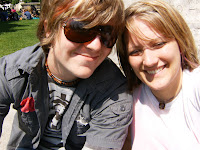I’m learning about the difference between cursed and fallen. Humanity and nature where affected differently by the fall. Nature was cursed to produce hardship for humanity. Nature was destined to groan until the redemption of all creation. Humanity was cursed because of the fall and also was, indeed, fallen in nature. Humanity was expelled from the Garden and therefore was separated from communion with God. Nature was not expelled and still is joined to God by complete obedience. I think, in speaking about death, and wondering about the presence or nature of death in the Garden, pre-Fall, this is important. I used to be of the mind that there must have been death in the Garden if nature is not fallen because of humanity’s fall. But I wonder if this new difference I’ve discovered will shed more light on that. There may not have been death in the Garden. This is why God says, “do not eat of it or you will die.” And at the Fall, humanity and its domain (nature) were subjected to the cycle of life and death until redemption. So nature was cursed because of it and so death entered the world, but nature was still not fallen from the presence or will of God. Also, I’m spending some time on the idea of the creation of nature as an act of hospitality on God’s part. (Thanks Sam) God prepares a place for humanity. Paul Marshall, Heaven is Not My Home, says that the creation of humanity is the culmination of all creation, the point. And in this idea we see a culmination of two truths occurring simultaneously. 1) Nature is created for the sole purpose of being the home to these human creatures 2) We are dependant upon nature for God’s provision. We cannot sustain ourselves. If Nature is created in preparation for humanity, the focus of God’s creation, we are able to liken it to a house that your parents build you and give to you. They say, “Son, you’re getting married and you will need some provision and protection. We have built you this beautiful house and it will give you shelter.” If we receive this gift from our loved ones, we would rightfully intend to do two things. 1) care for the house and revel in its details, not just because we are sure it will “keep giving” if we do so but because we want to honor and love the one who gave it. 2) We will delight in caring and preparing this space for others. We will invite others into our homes and pass the hospitality on to them. We can do these two things, and should for nature. So, even though the actions of humanity cannot possible harbor the power to permanently destroy or even redeem nature, we still must act. We must be compelled not out of a desperation that our resources will run out or God will cease to provide for God’s creation. Not out of a calculated prediction of what the future will hold and the affect that our current action have on it. But out of love, and most of all, gratitude to the giver of the ultimate hospitality. These acts of love and appreciation are those that reflect not fear but trust in the continued provision of God through nature.
 Went to Winchester today. I was late for the bus, this is me running after it.
Went to Winchester today. I was late for the bus, this is me running after it.
 Josh (UK)
Josh (UK)
 Winchester Cathedral: The largest Cathedral in Europe. We took Holy Communion there at noon.
Winchester Cathedral: The largest Cathedral in Europe. We took Holy Communion there at noon.
 The Royal Oak: The oldest Pub in England. It was dark.
The Royal Oak: The oldest Pub in England. It was dark.
 We don't have McDonalds like this in the States!
We don't have McDonalds like this in the States!
 Or candy like this...
Or candy like this...


